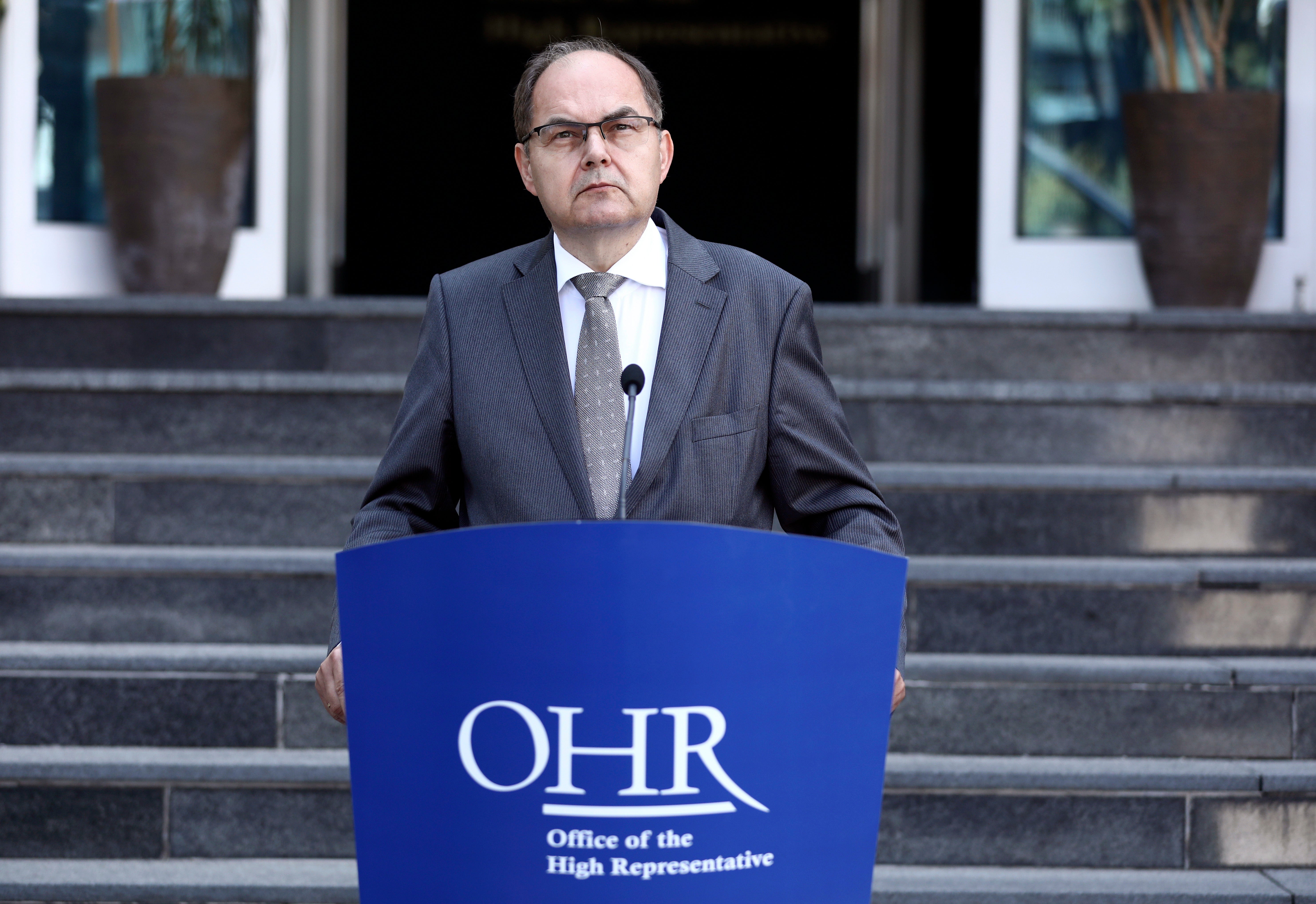International envoy warns of Bosnia breakup amid tensions
The chief international representative in Bosnia is warning that the war-scarred Balkan nation could face the biggest “existential threat of the post-war period” if the international community does not curb threatened separatist actions by Bosnian Serbs

Your support helps us to tell the story
From reproductive rights to climate change to Big Tech, The Independent is on the ground when the story is developing. Whether it's investigating the financials of Elon Musk's pro-Trump PAC or producing our latest documentary, 'The A Word', which shines a light on the American women fighting for reproductive rights, we know how important it is to parse out the facts from the messaging.
At such a critical moment in US history, we need reporters on the ground. Your donation allows us to keep sending journalists to speak to both sides of the story.
The Independent is trusted by Americans across the entire political spectrum. And unlike many other quality news outlets, we choose not to lock Americans out of our reporting and analysis with paywalls. We believe quality journalism should be available to everyone, paid for by those who can afford it.
Your support makes all the difference.The chief international representative in Bosnia is warning that the war-scarred Balkan nation could face the biggest “existential threat of the post-war period” if the international community does not curb threatened separatist actions by Bosnian Serbs.
In a report scheduled for delivery to the U.N. Security Council this week, High Representative for Bosnia and Herzegovina Christian Schmidt said “the prospects of further division and conflict are very real,” if Bosnian Serb leader Milorad Dodik withdraws Serb troops from the Bosnian army and creates a separate Serb force.
Those moves and other threats, if carried out, would "ultimately undermine the state’s ability to function and carry out its constitutional responsibilities,” Schmidt wrote, according to excerpts of his report carried by Bosnia’s Klix.ba portal.
Schmidt, a senior German diplomat, called Dodik’s threatened actions “tantamount to secession without proclaiming it.” He said they “endanger not only the peace and stability of the country and the region, but – if unanswered by the international community – could lead to the undoing of the agreement" that ended the Bosnian War in 1995.
Dodik responded Tuesday by dismissing the report as “a propaganda pamphlet” that was written to “favor Bosnian Muslims.”
The Bosnian War started in 1991 when Bosnian Serbs, with the help of the Yugoslav army, tried to create ethnically pure territories with an aim of joining neighboring Serbia More than 100,000 people were killed, and millions were left homeless during the worst bloodshed in Europe after World War II.
The war pitted Bosniaks, who are mostly Muslims, Serbs and Croats against each other and ended with the U.S.-sponsored peace agreement that created two regions, the Republika Srpska and the Bosniak-Croat Federation.
The two regions were given wide autonomy, but kept some joint institutions, including the army, the top judiciary and tax administration. Bosnia also has a rotating three-member presidency made up of Bosniak, Serb and Croat members.
Dodik, the Bosnian Serb member of the presidency, has for years been advocating for the separation of the Bosnian Serb mini-state and having it become part of Serbia. Such a move would unlikely win support from the United States and much of the West.
Dodik, who has tacit support from Russia and allies in Serbia, recently intensified his campaign, pledging that the Bosnian Serb parliament would by the end of November declare the creation of its own army, tax authority and judiciary.
He has threatened to take over the Bosnian army barracks located in the Serb half of Bosnia once the Bosnian Serb military is formed. He said that if the West tries to intervene, he would call Bosnian Serb “friends” for help, an apparent reference to Serbia and Russia.
A U.N. Security Council session where Schmidt was to deliver the report was originally scheduled for Tuesday but was postponed until later in the week. Extending the mandate of the EUFOR peacekeeping mission in Bosnia by one year is set for consideration by the Security Council.
Russia has threatened to veto the resolution approving the extension unless all references to the high representative for Bosnia are removed - an apparent attempt to undermine Schmidt’s authority as the observer of the 1995 peace deal.
____
Dusan Stojanovic contributed from Belgrade Serbia.